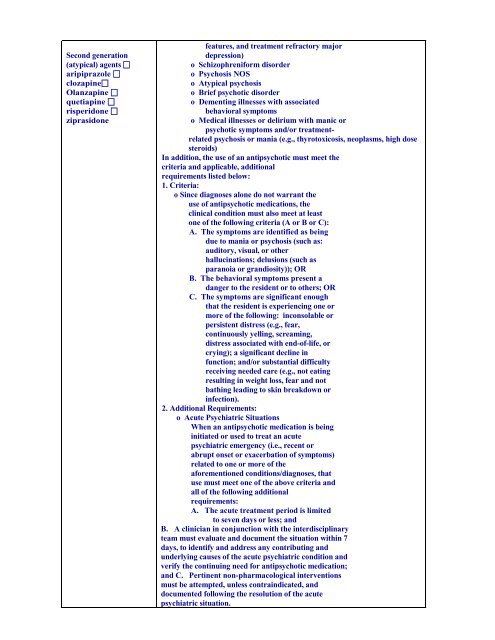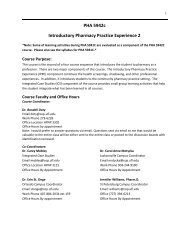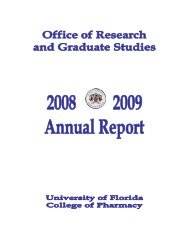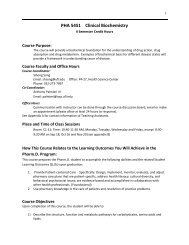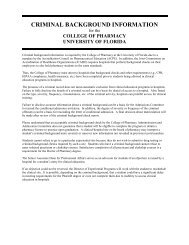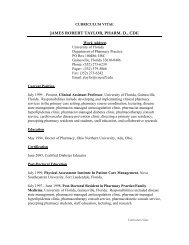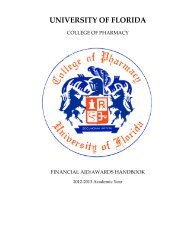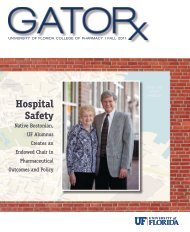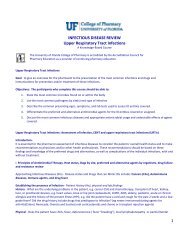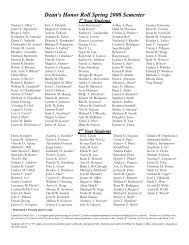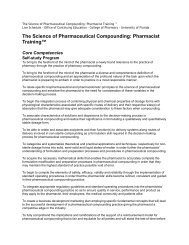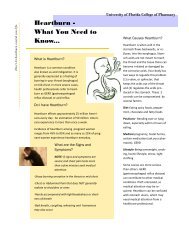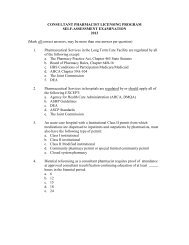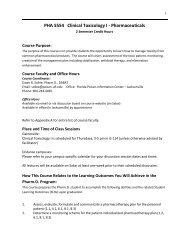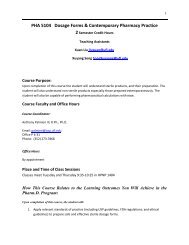Module 3: The Drug Regimen Review - College of Pharmacy ...
Module 3: The Drug Regimen Review - College of Pharmacy ...
Module 3: The Drug Regimen Review - College of Pharmacy ...
You also want an ePaper? Increase the reach of your titles
YUMPU automatically turns print PDFs into web optimized ePapers that Google loves.
Second generation<br />
(atypical) agents <br />
aripiprazole <br />
clozapine<br />
Olanzapine <br />
quetiapine <br />
risperidone <br />
ziprasidone<br />
features, and treatment refractory major<br />
depression)<br />
o Schizophreniform disorder<br />
o Psychosis NOS<br />
o Atypical psychosis<br />
o Brief psychotic disorder<br />
o Dementing illnesses with associated<br />
behavioral symptoms<br />
o Medical illnesses or delirium with manic or<br />
psychotic symptoms and/or treatment-<br />
related psychosis or mania (e.g., thyrotoxicosis, neoplasms, high dose<br />
steroids)<br />
In addition, the use <strong>of</strong> an antipsychotic must meet the<br />
criteria and applicable, additional<br />
requirements listed below:<br />
1. Criteria:<br />
o Since diagnoses alone do not warrant the<br />
use <strong>of</strong> antipsychotic medications, the<br />
clinical condition must also meet at least<br />
one <strong>of</strong> the following criteria (A or B or C):<br />
A. <strong>The</strong> symptoms are identified as being<br />
due to mania or psychosis (such as:<br />
auditory, visual, or other<br />
hallucinations; delusions (such as<br />
paranoia or grandiosity)); OR<br />
B. <strong>The</strong> behavioral symptoms present a<br />
danger to the resident or to others; OR<br />
C. <strong>The</strong> symptoms are significant enough<br />
that the resident is experiencing one or<br />
more <strong>of</strong> the following: inconsolable or<br />
persistent distress (e.g., fear,<br />
continuously yelling, screaming,<br />
distress associated with end-<strong>of</strong>-life, or<br />
crying); a significant decline in<br />
function; and/or substantial difficulty<br />
receiving needed care (e.g., not eating<br />
resulting in weight loss, fear and not<br />
bathing leading to skin breakdown or<br />
infection).<br />
2. Additional Requirements:<br />
o Acute Psychiatric Situations<br />
When an antipsychotic medication is being<br />
initiated or used to treat an acute<br />
psychiatric emergency (i.e., recent or<br />
abrupt onset or exacerbation <strong>of</strong> symptoms)<br />
related to one or more <strong>of</strong> the<br />
aforementioned conditions/diagnoses, that<br />
use must meet one <strong>of</strong> the above criteria and<br />
all <strong>of</strong> the following additional<br />
requirements:<br />
A. <strong>The</strong> acute treatment period is limited<br />
to seven days or less; and<br />
B. A clinician in conjunction with the interdisciplinary<br />
team must evaluate and document the situation within 7<br />
days, to identify and address any contributing and<br />
underlying causes <strong>of</strong> the acute psychiatric condition and<br />
verify the continuing need for antipsychotic medication;<br />
and C. Pertinent non-pharmacological interventions<br />
must be attempted, unless contraindicated, and<br />
documented following the resolution <strong>of</strong> the acute<br />
psychiatric situation.


